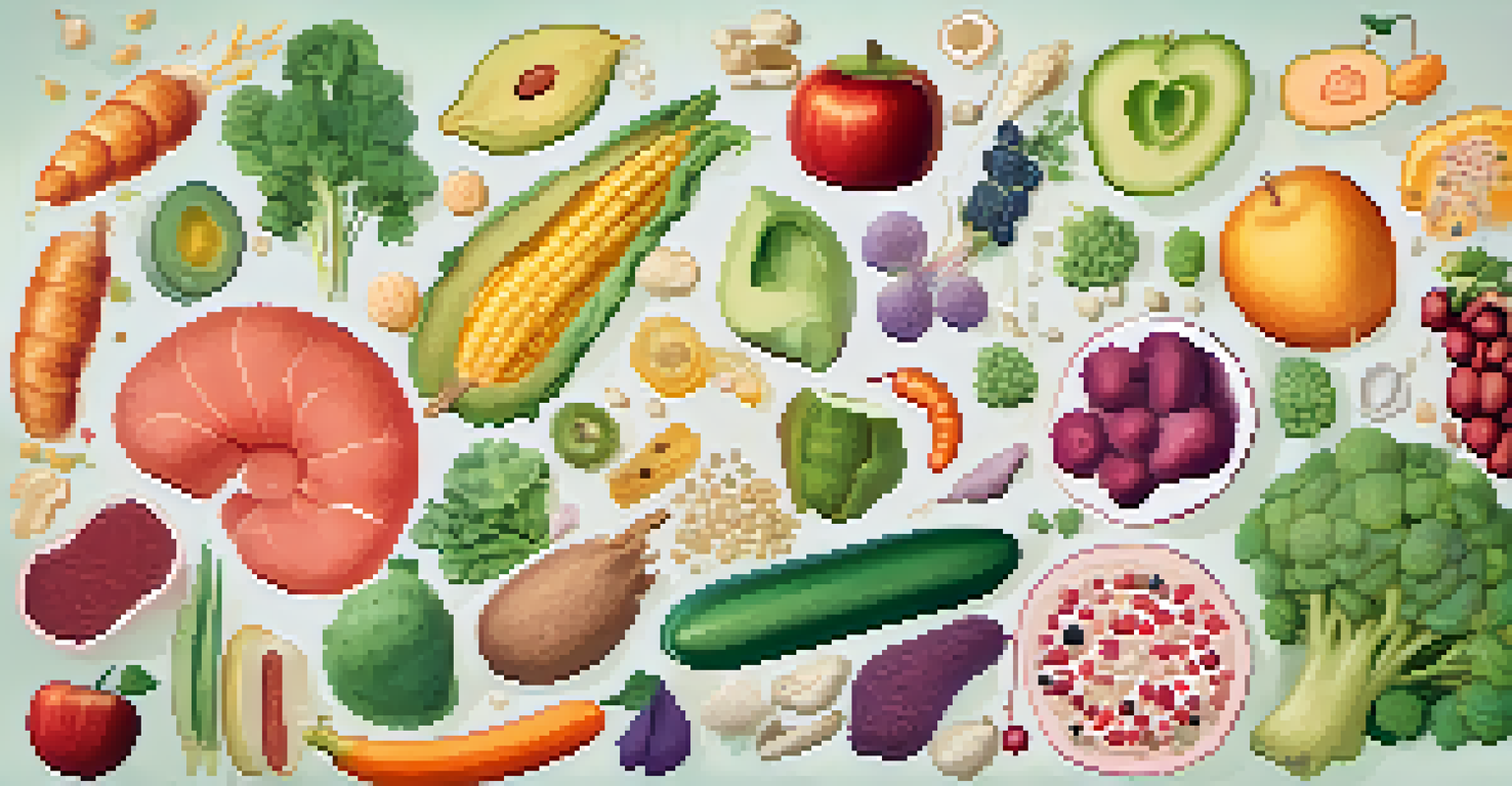The Relationship Between Veganism and Gut Microbial Diversity

Understanding Gut Microbial Diversity
Gut microbial diversity refers to the variety of microorganisms living in our intestines. This diversity is crucial because a rich microbial ecosystem is linked to better digestion, immune function, and even mood regulation. Think of it as a bustling city where different neighborhoods (microbes) contribute to the overall health of the community.
The gut microbiome is a key player in our overall health, influencing everything from digestion to mood and even our immune system.
A diverse gut microbiome can help break down various foods, absorb nutrients more effectively, and fend off harmful bacteria. Conversely, a lack of diversity might lead to digestive issues, inflammation, and other health problems. Essentially, maintaining a healthy gut is like ensuring all parts of a city are thriving and working together harmoniously.
Research has shown that diet plays a significant role in shaping gut microbial diversity. This is where veganism comes into play, as it typically emphasizes a wide range of plant-based foods that can nourish diverse microbial populations.
What Is Veganism and Its Core Principles?
Veganism is a lifestyle that excludes all animal products, including meat, dairy, and eggs, focusing instead on plant-based foods. This approach not only promotes animal welfare but also encourages a diet rich in fruits, vegetables, legumes, nuts, and grains. By adopting a vegan diet, individuals often find themselves exploring a variety of ingredients and recipes, leading to greater dietary diversity.

The core principle of veganism revolves around compassion towards animals and sustainability. However, the health benefits it offers, particularly in enhancing gut health, are gaining attention. A diverse diet filled with whole foods can provide the fiber and nutrients that beneficial gut bacteria thrive on.
Gut Health Thrives on Diversity
A diverse gut microbiome, supported by a varied diet, is crucial for better digestion, immune function, and overall health.
For many, transitioning to veganism can open the door to new flavors and cooking methods, making it easier to incorporate a wide variety of food sources into their meals. This exploration is a key factor in promoting gut microbial diversity.
The Role of Fiber in Gut Health
Fiber is a crucial component of a healthy diet and is especially abundant in plant-based foods. It acts as food for gut bacteria, helping them thrive and multiply. Think of fiber as the fuel for the gut's little workers, allowing them to perform their duties effectively and keep the ecosystem balanced.
Let food be thy medicine and medicine be thy food.
There are two types of fiber: soluble and insoluble. Soluble fiber, found in foods like oats and beans, dissolves in water, while insoluble fiber, present in whole grains and vegetables, adds bulk to stool. Both types play an essential role in promoting gut health and preventing constipation.
A vegan diet is typically high in fiber, which can lead to an increase in beneficial bacteria, promoting a more diverse gut microbiome. This diversity can lead to improved digestion, better nutrient absorption, and even a lower risk of chronic diseases.
Plant-Based Foods and Their Impact on Microbiota
Plant-based foods are rich in polyphenols, antioxidants, and other beneficial compounds that can positively influence gut health. These compounds can help modulate the gut microbiome by promoting the growth of beneficial bacteria while inhibiting harmful ones. Imagine them as the friendly neighbors in a community who help keep peace and order.
Different plant foods contribute various nutrients and compounds, which can lead to a broader range of gut bacteria. For instance, cruciferous vegetables like broccoli and kale contain compounds that can support specific beneficial microbes, enhancing overall diversity. The more varied your plant-based diet, the more diverse your gut microbiome is likely to be.
Vegan Diet Boosts Microbial Variety
Adopting a vegan diet rich in plant-based foods can significantly enhance gut microbial diversity, promoting a healthier gut ecosystem.
Incorporating a wide range of fruits, vegetables, nuts, and legumes can create a flourishing environment for gut microbiota. This approach encourages not just diversity but also resilience, making the gut better equipped to handle changes and stressors.
Research Findings: Vegan Diets and Gut Microbial Diversity
Numerous studies have highlighted the positive relationship between vegan diets and gut microbial diversity. For instance, research has shown that vegans often exhibit a greater variety of gut bacteria compared to omnivores. This finding suggests that a plant-based diet can promote a more balanced microbial ecosystem, which is crucial for overall health.
In one such study, participants who switched to a vegan diet for several weeks reported increased microbial diversity, along with improvements in digestive health. Their results indicated that the shift in diet could lead to rapid changes in the gut microbiome, illustrating the powerful impact of food choices.
Moreover, the increased diversity seen in vegan diets is associated with lower levels of inflammation and reduced risk of chronic diseases. These findings reinforce the idea that adopting a vegan lifestyle can be beneficial not just for individual health but also for promoting a thriving gut microbiome.
Potential Challenges and Considerations
While a vegan diet can promote gut microbial diversity, it also comes with challenges that need to be addressed. For instance, some individuals may struggle to obtain sufficient nutrients such as vitamin B12, iron, and omega-3 fatty acids, which can impact overall health. It’s essential for vegans to plan their diets carefully to ensure they’re meeting their nutritional needs.
Inadequate nutrient intake can lead to imbalances in gut health, undermining the very benefits that a vegan diet can provide. This highlights the importance of education and awareness when transitioning to a plant-based lifestyle. Consulting with a healthcare professional or nutritionist can help in navigating these challenges.
Fiber Fuels Beneficial Gut Bacteria
High fiber intake from plant-based foods serves as essential fuel for gut bacteria, helping them thrive and maintain gut health.
Additionally, individuals transitioning to veganism may experience temporary digestive discomfort as their gut adjusts to increased fiber intake. Patience and gradual changes can help ease this transition, allowing the gut to adapt and flourish over time.
Conclusion: Embracing Veganism for Gut Health
In conclusion, the relationship between veganism and gut microbial diversity is a fascinating and beneficial one. A varied, plant-based diet not only supports the growth of beneficial gut bacteria but also promotes overall health and well-being. By embracing veganism, individuals can nourish their gut microbiomes and contribute to a healthier lifestyle.
As we’ve seen, the key components of a vegan diet—high fiber, diverse plant foods, and a focus on whole ingredients—are instrumental in cultivating a rich microbial ecosystem. This diversity can lead to improved digestion, enhanced nutrient absorption, and a stronger immune system.

Ultimately, adopting a vegan diet can be a rewarding journey that not only benefits personal health but also has a positive impact on the environment. By making mindful food choices, we can promote both our health and the health of our planet.